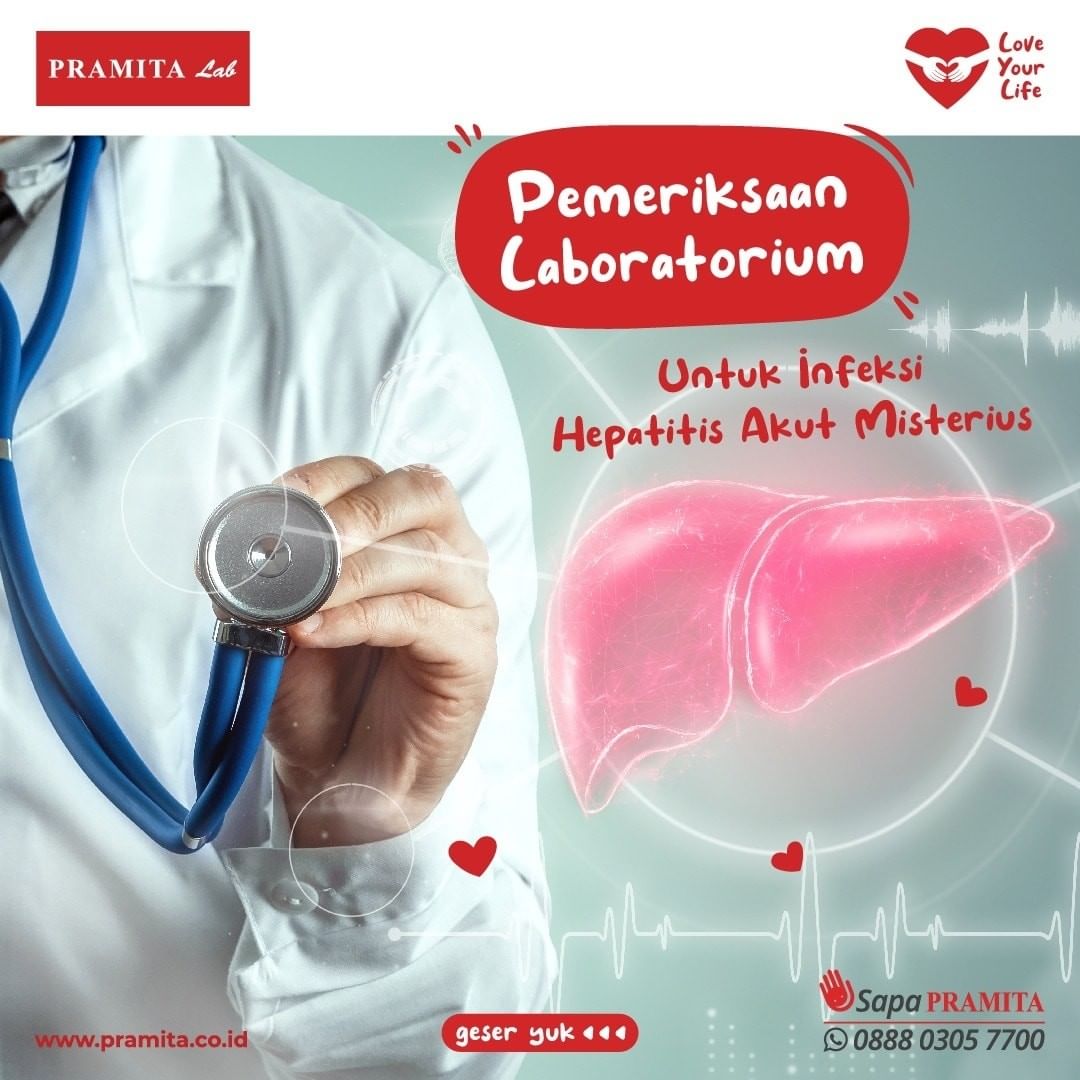Healthy Inspirations
Semua
Work Life
INFO PEMERIKSAAN
Parenting/Kesehatan Anak
LabPedia
Life Style
Kesehatan Wanita
Health Info
Millenial
Info Kesehatan
Mitos/Fakta

LABORATORY EXAMINATION FOR MYSTERIOUS ACUTE HEPATITIS INFECTION
Mon, 30 May 2022
Hepatitis is a disease that refers to inflammation that occurs in the liver. There are many types of hepatitis, namely hepatitis A, B, C, D, E, and G. Generally, this disease is caused by a viral infection. Although it can also be caused by other conditions, such as autoimmune diseases, drinking alcohol, and taking certain drugs.
To determine the diagnosis of hepatitis usually begins by asking the various symptoms that appear and what the patient's medical history is. Only then did the doctor perform various tests to confirm the diagnosis.
Some of the common symptoms that are usually experienced by people with hepatitis are:
• Experiencing flu-like symptoms, such as nausea, vomiting, fever, and weakness.
• Pale stools.
• Eyes and skin turn yellow (jaundice). This occurs due to increased levels of bilirubin in the blood.
• Stomach ache.
• Weight loss for no reason.
• Urine darkens like tea.
• Loss of appetite.
Laboratory examinations for the detection of Hepatitis Infection are:
1. Liver Function Test
This test is done by taking a blood sample, to check the performance or function of the liver. In this test, the levels of liver enzymes in the blood, namely the enzymes aspartate aminotransferase and alanine aminotransferase (AST/SGOT and ALT/SGPT) will be measured. Normally, both enzymes are found in the liver. However, if the liver is damaged by inflammation, the two enzymes will be spread in the blood so that levels increase.
2. Hepatitis Virus Specific Test
This test aims to determine the presence of antibodies that are specific for the HAV, HBV, and HCV viruses. Antibodies that can be detected in people with acute hepatitis are:
• Antibodies to hepatitis A (IgM anti-HAV)
• Hepatitis B Surface Antigen (HBsAg)
• IgM anti-HBc (if HBsAg positive)
• Antibodies to hepatitis C virus (IgM anti-HCV) or HCV RNA
• IgM anti-HDV (if HBsAg positive)
• IgM anti-HEV
If there are pediatric patients with one or more symptoms, such as: jaundice, acute abdominal pain, acute diarrhea, nausea/vomiting, decreased consciousness/convulsions, lethargy/malaise - myalgia/arthralgia, then proceed with blood tests.
Hopefully this information on laboratory tests regarding hepatitis can be useful and please contact PRAMITA Clinical Laboratory for more information.
Healthy greetings.
Author : dr. Luh Ayu K.D (Consulting Doctor for Medical Laboratory Clinic PRAMITA Branch Jl. Pajajaran No. 86 Bandung)
To determine the diagnosis of hepatitis usually begins by asking the various symptoms that appear and what the patient's medical history is. Only then did the doctor perform various tests to confirm the diagnosis.
Some of the common symptoms that are usually experienced by people with hepatitis are:
• Experiencing flu-like symptoms, such as nausea, vomiting, fever, and weakness.
• Pale stools.
• Eyes and skin turn yellow (jaundice). This occurs due to increased levels of bilirubin in the blood.
• Stomach ache.
• Weight loss for no reason.
• Urine darkens like tea.
• Loss of appetite.
Laboratory examinations for the detection of Hepatitis Infection are:
1. Liver Function Test
This test is done by taking a blood sample, to check the performance or function of the liver. In this test, the levels of liver enzymes in the blood, namely the enzymes aspartate aminotransferase and alanine aminotransferase (AST/SGOT and ALT/SGPT) will be measured. Normally, both enzymes are found in the liver. However, if the liver is damaged by inflammation, the two enzymes will be spread in the blood so that levels increase.
2. Hepatitis Virus Specific Test
This test aims to determine the presence of antibodies that are specific for the HAV, HBV, and HCV viruses. Antibodies that can be detected in people with acute hepatitis are:
• Antibodies to hepatitis A (IgM anti-HAV)
• Hepatitis B Surface Antigen (HBsAg)
• IgM anti-HBc (if HBsAg positive)
• Antibodies to hepatitis C virus (IgM anti-HCV) or HCV RNA
• IgM anti-HDV (if HBsAg positive)
• IgM anti-HEV
If there are pediatric patients with one or more symptoms, such as: jaundice, acute abdominal pain, acute diarrhea, nausea/vomiting, decreased consciousness/convulsions, lethargy/malaise - myalgia/arthralgia, then proceed with blood tests.
Hopefully this information on laboratory tests regarding hepatitis can be useful and please contact PRAMITA Clinical Laboratory for more information.
Healthy greetings.
Author : dr. Luh Ayu K.D (Consulting Doctor for Medical Laboratory Clinic PRAMITA Branch Jl. Pajajaran No. 86 Bandung)

